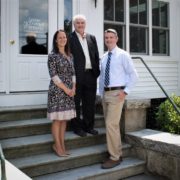Understanding The Recruiting Process for Accounting Students
Times are changing, and so is our profession – and that’s a great thing. Having been involved in the recruiting and hiring process for over ten years, I’ve seen firsthand significant modifications in the path from accounting student, to candidate, to full-time hire. In addition to the process being more competitive and fast-moving, shifts in the type of work public accounting firms (especially large firms) are performing means the recruiting process spans not just accounting majors, but also a variety of other fields of study, including information technology, law, engineering, and a multitude of others.
What to Know About the Accounting Recruiting Process
With regard to the hiring process as it relates to accounting majors, the most significant changes over recent years are the prevalence of internship opportunities (which, in many cases, lead to full-time employment) as well as the process being highly competitive and fast-paced.
Candidates should be ready for this process as soon as the school year begins, if not before. During September, many of the career fairs, resume reviews, and “meet the firm” events occur. Throughout late September and early October, many firms will visit college campuses and conduct on-campus interviews (OCR). Second interviews, typically at the firm’s offices, will also take place during October, with employment offers being made quickly – sometimes at the time of the second interview. While likely not effective until the following spring or fall, the timing of employment offers will provide the candidate peace of mind and the ability to focus on school.
Key Points to Consider When Going Through The Recruiting Process
When navigating through the recruiting process, there are several key points to consider for success. First, get your resume and cover letters drafted early. Take advantage of school resources, such as development offices, resume templates, resume reviews, and mock interview events.
Resumes should be concise but memorable – consider including charitable service or special interests rather than using excel pivot tables or completing federal taxation II. Additionally, many schools utilize an outside platform (i.e., Handshake) to facilitate the process, including the posting of job opportunities, resume uploads, and scheduling of interviews. Make sure to know what process your school utilizes and become acquainted with it.
Before applying for any positions, we encourage candidates to make a list of items that are important to them and look for the firm that best fits their needs. For some candidates, the most important factors may be the presence of true work/life balance or the ability to work remotely or in a relative geographic area. For others, they may value the field of practice or being in a big city. When deciding on which positions to apply for, make sure you don’t put all your eggs in one basket – similar to applying to college. Diversifying the application process can increase your options when making your final decision.
Put Your Best Foot Forward During The Interview Process
Once you apply for a position and are selected for interviews, the real fun begins. Hopefully, by this point, you have had a chance to research the firm and possibly interact with some of their staff at a career fair or similar event. Preparation for the interview is extremely important. Bring a list of questions for the firm or the interviewer as well as additional copies of your resume, and should be ready to take notes.
During the interview, it’s essential to be memorable. Show an interest in the firm and the interviewer. Ask questions that show you’ve done your homework, and don’t be afraid to do the talking. In addition to a strong educational foundation, most firms are looking to hire someone primarily based on fit with their existing culture.
While most interviewers do not ask technical questions, candidates are expected to have a general awareness of current events in our profession. The Uniform CPA exam will likely also come up in conversation, with the 150 credit hour requirement being a key factor. Candidates should be aware of the necessary educational and credit hour requirements for licensure and should have a plan on how they will be studying for the exam. This also allows the candidate to ask some tough questions, including assistance with the exam materials and testing costs as well as bonuses for passing the exam.
Once the interview is complete, make sure to follow-up with a handwritten or email note of gratitude. Second interviews are typically only scheduled for candidates the firms view as a good fit, so be ready for the process to move quickly. Follow-up interviews are an excellent opportunity to see the firm’s office, meet some staff members, and help the candidate decide if the firm is right for them. Offers of employment will be the next step. It’s important to remember that all candidates and firms are going through the same process. Communication is key in this process; make sure to be upfront if you are trying to decide between firms or have other interviews scheduled.









